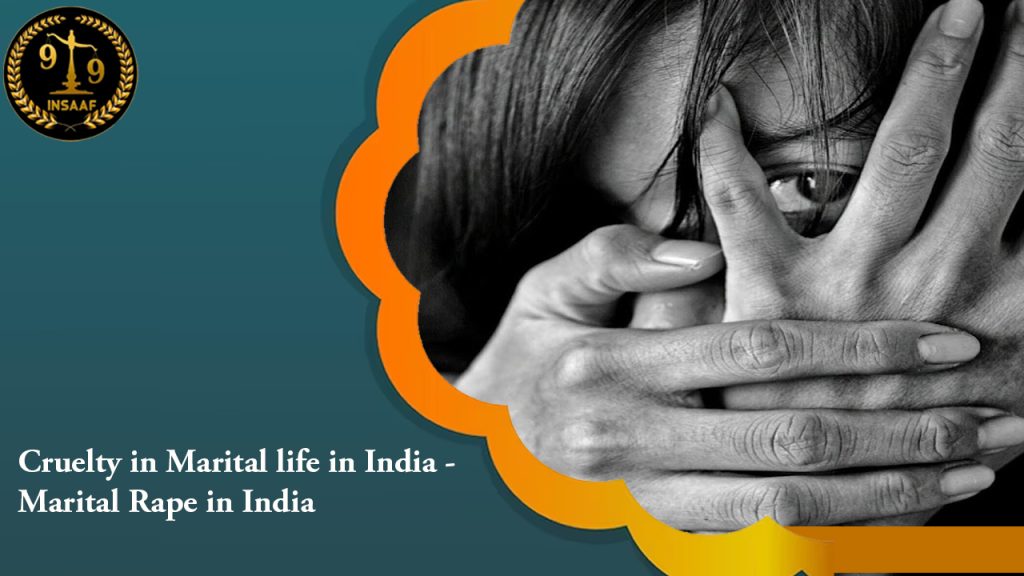

Online Legal Advice from Insaaf99® Online Lawyer Consultation in India


Online Legal Advice from Insaaf99® Online Lawyer Consultation in India

Marriage, an institution often revered as a sacred union of love, companionship, and unwavering support, paradoxically conceals a dark and pervasive reality marital rape. In India, this grim underbelly of matrimony remains largely shrouded in silence, a pervasive yet hidden atrocity that continues to inflict untold suffering upon countless women. Let us delve into the profoundly disturbing status of rape in India, exposing the hidden horrors and illuminating the urgent need for reform and widespread awareness.
Marital rape is a distressing occurrence characterized by sexual intercourse forced upon a spouse without their consent. This abhorrent act infringes upon essential principles such as consent, bodily autonomy, and an individual's right to personal safety, irrespective of their marital status. Unlike numerous other countries, India does not have explicit legal provisions criminalizing rape, which perpetuates this prevalent form of abuse.
Legal Ambiguity: Section 375 of the Indian Penal Code exempts non-consensual intercourse within marriage. This legal loophole, in contradiction to fundamental rights, perpetuates debates and controversies.
Underreported Reality: The pervasive social stigma associated with marital rape discussions contributes to its widespread underreporting. Fearful of repercussions, victims often remain silent to avoid social isolation and backlash. As a result, official statistics merely represent the surface of a far deeper issue, with countless survivors enduring in silence.
Lack of Support Systems: India lacks comprehensive support systems and services for victims of marital rape. This further discourages survivors from seeking help and justice, leaving them trapped in a cycle of abuse.
In India, a growing movement of organizations and activists is relentlessly striving to change the status quo and eradicate the scourge of marital rape. These courageous individuals are spearheading the fight for legal reforms, raising social awareness, and establishing crisis centers to provide refuge and support to survivors of rape. Their unwavering efforts are a beacon of hope for countless women trapped in silent suffering.

India's perspective on marital rape in international human rights forums has undergone a notable shift, moving from initial hesitation to increasing acknowledgment. This evolution is the result of several factors and considerations.
Historical Perspective: India's initial stance on marital rape was characterized by resistance, prioritizing cultural norms over international pressure. This resistance stemmed from deeply ingrained patriarchal beliefs and societal structures that viewed rape as acceptable or even a husband's right.
Recognition of the Problem: In recent years, the efforts of advocacy groups have led to a growing recognition of marital rape as a human rights violation.
Global Initiatives: India actively participates in international forums, including the United Nations, but it maintains a cautious stance on explicitly criminalizing rape.
The CEDAW Perspective: Despite being a signatory to CEDAW (Convention on the Elimination of All Forms of Discrimination against Women), India has yet to ratify the Optional Protocol, which could provide a mechanism to address violations like marital rape.
To effectively combat gender-based violence, it is crucial for India to align its domestic laws with international human rights standards, ensuring women's rights and bodily autonomy are protected within the institution of marriage.
The Supreme Court has made significant observations regarding marital rape, recognizing its seriousness and calling for legislative action.
Independent Thought v. Union of India (2017): In this case, the Supreme Court acknowledged the gravity of the issue of marital rape and urged the government to address it. However, the court did not issue a directive to criminalize marital rape, deferring to the legislature.
RIT Foundation v. Union of India (2022): In this case, the Delhi High Court declared the marital rape exemption in Section 375 of the Indian Penal Code (IPC) unconstitutional. The High Court's decision is currently being appealed in the Supreme Court.
Right to Dignity and Bodily Integrity: The Supreme Court has stressed that cases of marital - rape violate the rights to live with dignity and bodily integrity. These fundamental rights, enshrined in the Indian Constitution, guarantee individuals freedom from physical and mental harm and the autonomy to control their bodies.
While the Supreme Court has not yet issued a definitive ruling on rape, its observations and the recent Delhi High Court decision have created momentum for change.
Marital rape is not a mere marital issue; it is a gross violation of human rights that demands immediate attention. With unwavering determination and collective action, we can transform the landscape of marital - rape in India. By reforming legal frameworks, building support systems, and fostering a culture of consent, we can create a future where every individual lives free from fear, coercion, and abuse.
Insaaf99, an online legal consultation firm, plays a crucial role in Marital-Rape cases by offering expert legal guidance and support. They connect survivors with experienced lawyers who specialize in gender-based violence cases, ensuring that victims have access to legal advice, protection, and assistance in navigating the complex legal system. Insaaf99 helps survivors understand their rights, file cases, and seek justice while maintaining confidentiality and sensitivity. By providing a safe and supportive platform, Insaaf99 empowers survivors to address Marital Rape and work towards legal resolutions and remedies.